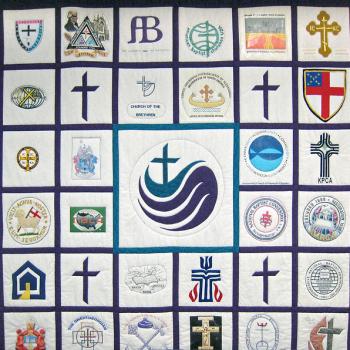Cantor classified the set of all counting numbers (1, 2, 3, 4 . . .) as an infinite set. There’s no end to that list; there are countless counting numbers. This is a widely accepted fact about counting numbers, and was generally accepted at the time.
But when Cantor looked at the set of all real numbers (all the counting numbers and all the negative numbers and all the decimals and fractions between those positive and negative numbers), he concluded that real numbers were “more numerous” than counting numbers.
Did you catch the problem? If the set of counting numbers is never-ending—that is, infinite in size—how can another set contain more numbers than that? The basic assumption had been that all infinite sets contained the same innumerable quantity of objects.
Cantor was not merely making a guess or assumption; he offered a mathematical proof that there exist an “infinity of infinities.” That is, there are more infinities than we can count. . . .
The response from the Christian community was no different [from other mathematical critics]: This idea of “multiple infinities” smacked of relativism and pluralism, the great enemies of the day’s orthodoxy.
Today, many Christians still look askance at Cantor’s discoveries. A popular homeschool textbook sponsored by a prominent Christian university proudly claims that its math curriculum “provides attractive, legible, and workable traditional mathematics texts that are not burdened with modern theories such as Set Theory.” Well, then.
What if instead of threatening our theology, Cantor’s discovery of multiple infinities actually enhanced our understanding of God?
A number of biblical verses use spatial or numerical metaphors to help us grasp the infinity of grace as well as of God himself. Like, “[A]s far as the east is from the west, so far has he removed our transgressions from us” (Ps. 103:12). How far is the east from the west exactly? Sounds like infinity to me. “‘I am the Alpha and the Omega,’ says the Lord God, ‘who is, and who was, and who is to come’” (Rev. 1:8). When did God “begin”? How long is eternity? What is time like for God? Infinity seems like a part of the answer to each of these questions.
But there is one verse for which Set Theory seems especially apt: “Are not two sparrows sold for a penny? Yet not one of them will fall to the ground outside your Father’s care. And even the very hairs of your head are all numbered. So don’t be afraid; you are worth more than many sparrows” (Matt. 10:29–31).
When most of us think of “infinity,” we think of numbers climbing toward some enormous, unreachable total. But again, note Cantor’s discovery. The set of real numbers is not a larger infinite because those numbers go “farther into infinity.” It’s the spaces between the counting numbers that give the set of real numbers its size. It’s in the minute detail, the countless rational and irrational numbers squeezed between each other and between the counting numbers: The square root of two, –1/3, Pi. Cantor demonstrated that there are more real numbers between zero and one than there are counting numbers between one and infinity.
Similarly, God’s infinitude is not found only in his massive, eternal, overwhelming presence, but in every minute detail of life, every crack and crevice of the universe. So much so that he knows the number of hairs on our head and grains of sand on the beach, and he counts every star in the heavens, each of which—by the way—he also knows by name (Ps. 147:4).
God is not only an infinitely distant and big God, but also infinitely present in the smallest details.
One other verse worth noting: “Oh, the depth of the riches of the wisdom and knowledge of God! How unsearchable his judgments, and his paths beyond tracing out!” (Rom. 11:33). Cantor, himself a devout Christian, believed that he was called to reveal Set Theory to the world, and that it at least suggested the reality of God. He wrote, “There is no doubt that we cannot do without variable quantities in the sense of the potential infinite. But from this very fact, the necessity of the actual infinite can be demonstrated” (emphasis added).
No one argues that Set Theory proves God’s existence or anything about his character. But those with eyes of faith nonetheless see a reflection of God in it, even as the theory and God leave us finally speechless: His ways are even more inscrutable than Set Theory. In the face of such mystery, I often feel compelled to simply offer praise.
















